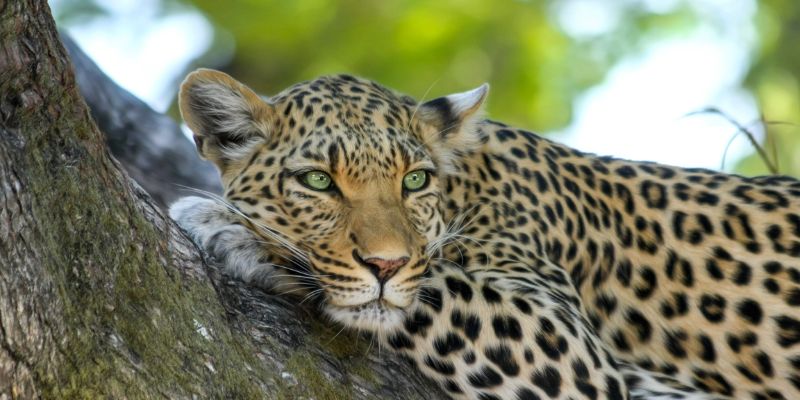


Leopard hunting in Africa is a true test of stamina, determination, and patience. Many international trophy hunters consider leopards to be the most beautiful of Africa’s Big 5, especially a mature, battle-scarred tom cat weighing in at over 200 pounds.
Hunting one of Africa’s most coveted trophies has seen many big game hunters waiting night after night for a sly and cunning Leopard to climb a tree and approach a bait.
Timing a Leopard hunt is of utmost importance, and the hunt must be planned so that the safari is conducted during the most favourable conditions, taking a variety of factors into account, such as the phases of the moon and the season of the year. Leopard hunts typically take place between March and November.
Leopard hunts can be tiring, uninteresting, and most frustrating when nothing goes to plan, or one of the most exhilarating hunting moments when the plan comes together and your trophy is in the salt! Instead of following fresh tracks and covering ground, Leopard hunting is all about “playing the waiting game,” sitting for hours and spending days in strategy, waiting for a cat to appear.
A Leopard hunt is all about outwitting your opponent, which at times can be disheartening, but the rewards are exceptional.
Leopard hunts typically take place on an African safari, which is conducted for 14 days and 15 nights. No credible outfitter will guarantee that the international hunter will harvest their trophy Leopard. Making poor choices regarding what is deemed a suitable Leopard hunt can be costly. Leopards are the toughest cats to hunt in Africa, and any adult male Leopard is considered a fine trophy.
Available Leopard Hunts
Leopards are distributed throughout the sub-Saharan areas of the African continent, and Leopard hunts are permitted in most countries that allow game hunting safaris, such as Namibia, Zambia, Tanzania, Mozambique, Uganda, and Ethiopia. Leopard hunts in countries such as South Africa are often affected by hunting closures and problems with permits.
Always ensure, by consulting our team at Game Hunting Safaris, that your chosen African outfitter has quota available for the season. Do not be shy or hesitate to ask for proof of such quota.
Large specimens of trophy Leopards are harvested in Zambia’s famous Luangwa Valley, Niassa in Mozambique, and Tanzania. Free-Range concessions such as Bushmanland in Namibia are also famous for producing big cats during daylight hours; however quota is limited to preserve and safeguard these areas of pristine wilderness. Zimbabwe is also famous for Leopard hunts, with high success rates.
Countries such as Botswana and Mozambique offer Leopard hunts using hounds, perfect for hunters wanting an action-packed adrenaline-filled hunt. Hunting Leopard with hounds is considered by some to be a preferred method, as both the hunter and Professional Hunter have a better opportunity to sex and age the Leopard.
Countries, such as Tanzania, do not allow Leopard hunts to be conducted at night. The best time, with the greatest chance of success, would be when these elusive cats are active, which would be in the early mornings and evenings, being dawn and dusk when they are likely to check a potential bait site.
At these peak times, hunters will need to be ready, waiting, and on high alert, certain that all equipment has been thoroughly tried and tested. The optimum window of opportunity is often small, and things can “get a little crazy” at a moment’s notice.
Cape Buffalo hunting in Mozambique is best undertaken during the dry season, running from July to November.
If the Leopard hunting destination of choice allows for nocturnal Leopard hunts, it is debatable whether a full moon is preferable or not. Consult your outfitter, who will be experienced and have an opinion on the matter, and who can give needed advice.
Leopard hunts are preferred during the cooler months when these cats seem more active. The colder periods also assist with keeping the bates fresh, as Leopards generally do not consume rotten meat. High-fat baits with the skin still on assist with the bait lasting longer before having to be replaced.
Successfully harvesting a trophy Leopard is one of the most rewarding dangerous game hunts in Africa. This African cat can move at lightning speed, so Leopard shot placement is critical.
Many hunters and Professional Hunters have been seriously mauled, and some have been killed by a wounded Leopard. A Leopard's claws and teeth cause polymicrobial infection, which can be life-threatening if not treated, and is caused by the introduction of bacteria into the wounds. The combination of bacteria and compromised tissue can complicate the healing process, which results in difficult recovery for those injured in the Leopard hunt.
Taking all the above into consideration, a full mounted Leopard trophy makes one of the finest displays! Skilled taxidermists often present these incredible cats mounted with their prey in their mouths or on a lateral branch. Leopard skull, pedestal mounts, and rugs are also popular mounts.
A standard Leopard hunting safari will include the basic service offerings such as accommodation, meals, drinks, professional hunter, camp staff, trackers, on-territory transport, and field preparation of the Leopard trophy.
Exclusions and optional extras when booking a Leopard hunt in Africa:
Whether it’s finding leopard hunts, stalking, or walking and stalking at dawn, we’re here to deliver the experience of a lifetime with integrity and precision.
✉️ Contact us today to speak with an expert and plan your tailored crocodile adventure.
🌍 Browse our active hunting listings and secure your preferred species and dates.
Search from our range of Hunts across various popular destinations in Africa.
Book Your Hunt